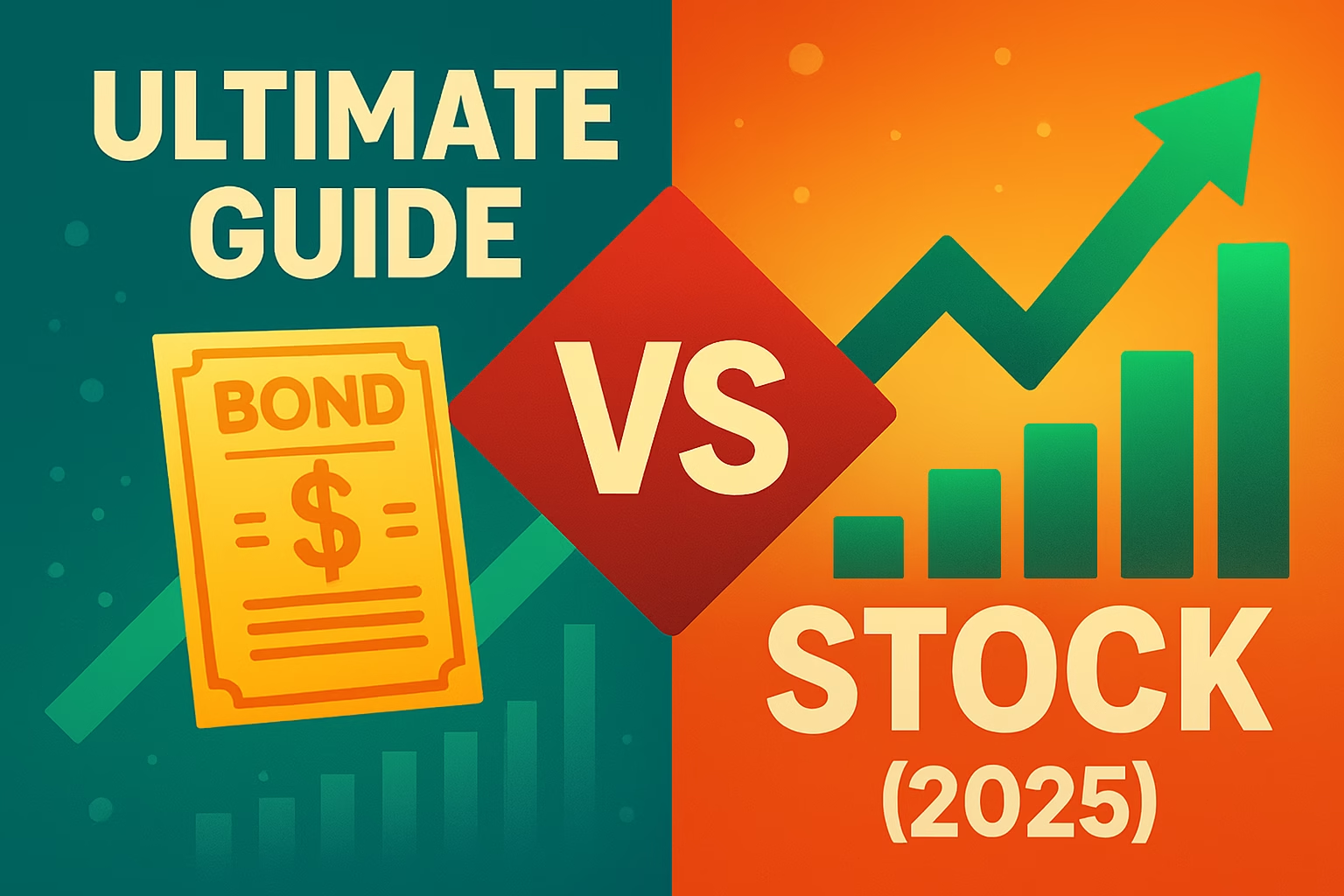Before we start comparing bond vs stock, we should know about what is stock? and what is bond?
Stocks
Usually entities issues stocks to raise capital for the new projects, to expand their business or also for other activities of companies. When you invest in stock, you are basically buying a small piece of share of that company, that’s why stock is also known as share or equity. Stock represents ownership in a company, person who invest in stock are also known as shareholder or owner of company.
Ex. Let’s assume that company XYZ issues, 1000 share at ₹10 per share, so total number of shares are 1000/10 = 100 and you invest in 50 shares that means you own 50% of the company. After a year your share prices become ₹20, then your investment value gets doubled.
a. Common stock:
Most stocks you see in the stock market like Apple, Google, reliance are common stocks, they represent basic ownership in company and they come along with certain features like ownership in company, they may receive dividend in case of profit, they have voting rights. Common stock are higher in risk or in case of bankruptcy, common stocks are last one to get paid.
b. Preferred stock:
As name suggests preferred, Preferred stocks are preferred over common stocks in case of bankruptcy. Preferred stocks are lower in risk, have fixed dividends and ownership in company.

Bonds
Bonds are fixed income securities. Government and Private entities issue bonds for raising capital to fund their existing operations and upcoming projects.
Government and Private entities are issuers of the bonds and individuals who invest in those bonds are known as bondholders.
Interest yield (Coupon rate) and maturity date are predetermined at the time of issue. Entities repay interest on the Face Value of the bond and principal amount at the time of maturity.
Ex. 100 rupees bond has coupon rate of 10% and maturity of 2 years. Individual will receive 10 rupees per year for 2 years and 100 rupees at the end of the 2nd year.
Bond vs Stock
Now we know that what is stock and what is bond, we will compare bond and stocks on the basis of maturity, risk, rights, investor goal and market certainty.
Risk:
Stock have high risk than bonds, there is no guaranteed return, there is risk of price fluctuation. compared to stocks.
Bonds have regular interest payment at regular interval, the interest rate is fixed and principal returned at maturity.
Maturity:
Stocks don’t have any maturity date we can hold stock for indefinite time or sell anytime.
Bond have fixed maturity period. The principal amount will be repaid at the date of maturity.
Ownership Rights:
Stockholders are also known as shareholders. They are considered as owner of company and may also have voting rights at shareholder meeting.
Priority in bankruptcy:
Shareholder are last one to get paid in case of Bankruptcy.
Bondholders have higher priority in case of bankruptcy and get paid before any other shareholder.
Market certainty:
Stocks are volatile in nature because stock price is fluctuate on daily basis whereas born prices are more stable and have fixed interest payments.
Which one you should choose?
Bonds and stocks are commonly used instruments for investing. Both are very essential in financial market. We understood the difference between Stocks and Bonds Now it’s easy to compare them on the basis of how investor wants to build their portfolio?, What are the financial goals of investor?
Investing in both stocks and bonds can diversify one’s portfolio and it is great option to choose.You should choose Stocks if you are looking for higher returns and ready to take higher risks and wants to invest for a long time horizon. Investing in stocks can give you good capital growth and dividend income.
You should choose Bonds if you’re planning for retirement or wants stable and regular income at regular intervals or one who wants to diversify his portfolio.
Investing in any instrument is depends upon how investor is looking at his future financial goals. What is he’s willingness to take risk? Read all the documents carefully before investing in any kind of instrument. Take investment advises only from CFP, SEBI Registered investment advisor.
Where does Bonds and Stocks are traded?
Trading of Stocks:
Stock are traded on stock exchanges. Stock exchanges are centralised platform which brings sellers and buyers together in same platform. Usually publicly listed companies trade here, stock exchanges have fixed trading hours and investor trade through online platform or stockbroker and prices are fluctuate on real time basis due to the demand and supply. Investors can buy and sell stocks through online brokers who offers services to their client, they make orders on the behalf of clients,offers real time charts and many more services
Stock exchanges in different countries
USA: NASDAQ(National Association of Security Dealers Automated Quotations), NYSE(New York Stock Exchange)
India: NSE(National stock exchange), BSE(Bombay Stock Exchange)
UK: LSE(London Stock Exchange)
Trading of Bonds:
Trading of bonds are different than stocks, most bond traded over the OTC and some are traded on public exchange. OTC market works with the help of Broker or dealer, they trade bonds directly between two parties, there are no centralised exchange to control them.
US treasury bones are traded on TreasuryDirect platform or secondary markets
If you like our content pls comment or if you need any other topic pls let us know.
